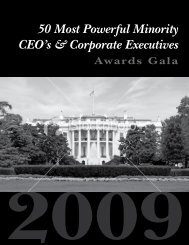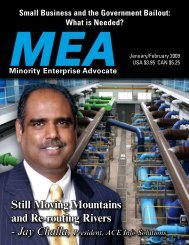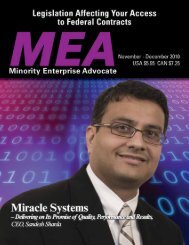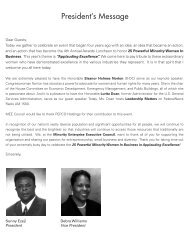Cultivating The Leader Within - Minority Enterprise Executive Council
Cultivating The Leader Within - Minority Enterprise Executive Council
Cultivating The Leader Within - Minority Enterprise Executive Council
- No tags were found...
You also want an ePaper? Increase the reach of your titles
YUMPU automatically turns print PDFs into web optimized ePapers that Google loves.
Your Spending. You probably do not<br />
limit yourself to spending only 70%<br />
of your salary If you do and/or will<br />
do so for the 10 years or so preceding<br />
your retirement; I can tell you that you<br />
are both rare and likely to be in very<br />
good shape at retirement. However,<br />
most Americans, spend as much as<br />
90% or 95% of it and are unlikely to<br />
spend less unless forced too. Most<br />
people only change spending habits<br />
in response to economic necessity<br />
or in pursuit of new financial goals.<br />
People don’t want to “live on less”<br />
once they have had “more”. Yet in<br />
the world that exists post 2008, it<br />
is clearly time to strongly consider<br />
adjusting to “less is better”.<br />
Personal Health. Almost all of us<br />
will have a major health challenge at<br />
sometime in our life. It could even be<br />
chronic health issues that last for the<br />
balance of our lives. While none of us<br />
like to think about this most unpleasant<br />
possibility, based on our longer life<br />
spans it is prudent to consider. So before<br />
you become a retiree, stop and think<br />
about the potential costs of prescription<br />
medicines, and recurring treatment for<br />
chronic ailments and...make sure you<br />
include them in your contingency plans.<br />
I have seen these costs take a bite out<br />
of retirement income for others, even<br />
when they had a great health care<br />
plan. Even with generics helping to<br />
stem the rising increase of prescription<br />
drug costs, still one estimate found<br />
that a 65-year-old couple who retired<br />
in 2011 would pay $230,000 for health<br />
care costs, excluding insurance and<br />
Medicare, including the costs for<br />
nursing home care. 3,4<br />
Investments. With most people retiring<br />
in the future either without a pension<br />
or a modest one, the importance<br />
of personal savings cannot be over<br />
emphasized. Unfortunately far to many<br />
people retire without haven’t had their<br />
investments reviewed in years. <strong>The</strong><br />
asset allocations from three years ago<br />
may have needed to be changed so<br />
clearly the one from 10-15 years ago<br />
is likely no longer appropriate. Retirees<br />
sometimes carry too much investment<br />
risk in their portfolios (including today<br />
too much invested in bonds!) and<br />
other times have not diversified to<br />
achieve needed growth for a 40 year<br />
retirement that must keep pace with<br />
price inflation. <strong>The</strong> results being that<br />
the retirement income from their<br />
investments fluctuates wildly, which<br />
then creates anxiety and sometimes<br />
panic driven decisions.<br />
Social Security (or lack thereof).<br />
Will Social Security even exist by<br />
the time you’ve retired Not to be<br />
political, yet, a recent study from the<br />
Government Accounting Office (GAO)<br />
compels any retiree or future retiree<br />
to face that question. <strong>The</strong> study in<br />
summary states that the beloved<br />
program may start to run out of money<br />
by 2036 and may be broke by the end<br />
of that decade. Additionally, to keep it<br />
solvent, the GAO suggests a 20% cut<br />
in benefits, due to increased longevity<br />
(there’s that heredity again) and less<br />
workers. Even if SSI is still a going<br />
concern in 2040, it probably will not be<br />
the same as your Mom and Dad’s. 3,4<br />
Given those factors, creating a<br />
retirement plan makes a lot of sense. A<br />
budget – and the discipline to stick with<br />
it – may make a financial difference.<br />
Do you know if you have enough<br />
When it comes to planning your<br />
retirement just reading articles like<br />
this one, using some calculators, and<br />
making some assumptions may prove<br />
to be a disaster waiting to happen in<br />
the future. Take the time to find and<br />
meet with a retirement planner you<br />
trust, while you are still working to<br />
help you estimate your lifestyle needs,<br />
expenses (short-term & long-term) and<br />
contingency plans. A solid retirement<br />
plan including a budget, along with<br />
the discipline to follow through<br />
will make a big financial difference.<br />
Because once you get a few years into<br />
retirement, the chances of and your<br />
ability to generate additional income<br />
is significantly reduced…and besides,<br />
who wants to have go back to work<br />
Citations<br />
1<br />
- http://fmsadvisors.com/fmsadvisors.<br />
aspxMyMenu=newplanning&MyPage=<br />
nh/calculators.asp&SessionID=87297547<br />
2<br />
- http://transgenerational.org/aging/<br />
demographics.htm<br />
3<br />
- www.nytimes.com/2007/09/21/<br />
business/21generic.html_<br />
r=1&oref=slogin<br />
4<br />
- www.reuters.com/article/2012/02/23/<br />
us-column-miller-retirementcostidUSTRE81M24M20120223<br />
Financial Management Strategies,<br />
LLC (FMS) is a Registered Investment<br />
Advisory firm in the State of Maryland,<br />
providing its advisory services to both<br />
institutions and individuals.<br />
Mr. Petiri is the owner of Financial<br />
Management Strategies, LLC (FMS)<br />
a Registered Investment Advisor<br />
established in the year 2000. His nearly<br />
two decades of financial experience<br />
covers virtually all areas of finance from<br />
tax, insurance, stockbroker, personal<br />
financial planning and personal banking<br />
to corporate credit, business planning<br />
and consumer lending.<br />
Mr. Petiri has frequently been heard<br />
on WEAA (88.9 FM) as a financial<br />
commentator, appeared on WMAR-TV<br />
2 regarding the 2008 & 2009 economic<br />
downturn, and MTA Commuter<br />
Connections regarding residential land<br />
development. He has been interviewed<br />
and quoted by the Investment News<br />
magazine, written for the Journal<br />
of Personal Finance, is a frequent<br />
contributor to the IARFC publication,<br />
<strong>The</strong> Register, Popular Finance (of<br />
China), and publishes a monthly<br />
financial advice column called the<br />
Foresight. Mr. Petiri was also quoted<br />
in Bankrate.com and currently writes<br />
for the Baltimore Examiner. Walid<br />
also serves on the Finance Committee<br />
of Associated Black Charities and is<br />
member of Bethel African Methodist<br />
Episcopal Church. He is a devoted<br />
parent to his son and daughter.<br />
<strong>Minority</strong> <strong>Enterprise</strong> Advocate • March – April 2012<br />
29








